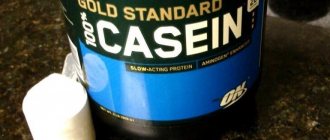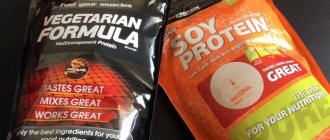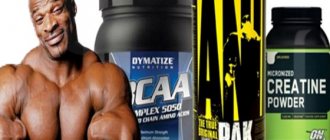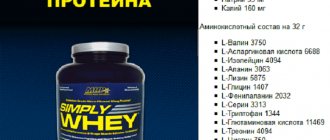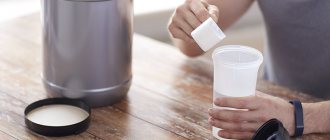The benefits of drinking protein shakes when gaining muscle mass. Their main varieties and nuances of choice. The Internet is a source of knowledge, no doubt. But it contains a lot of contradictory information that cannot be trusted unquestioningly - it must be “filtered”. In particular, novice athletes are faced with statements that drinking protein is very harmful. At the same time, additional protein is completely dangerous for teenagers. So, is protein bad for your health? Let's look at this in more detail.
Does a young body need a protein supplement?
Before you understand at what age the younger generation can take protein, you should understand the purpose of its use. It is necessary to analyze why a teenager may need additional supplementation. What exactly do proteins and other drugs give to a young body that regular food cannot give them?
In many cases, adults are guided by the opinion of a more competent person, a coach. The second point is that the teenager’s parents want to solve, with the help of sports nutrition, problems that arise due to mistakes in other areas of the child’s life. In particular, this applies to training and lifestyle in general.
And sometimes adults simply want the impossible. For example, their child is growing thin, and they want to correct this, for which they force him to use sports nutrition. Errors in the training regime can lead to the fact that the weight will not grow, even if intensely.
If all these points are taken into account, you can move on to the next step and decide at what age to allow your child to drink protein.
At what age can you drink?
There are no strict restrictions on the age at which protein supplements are needed or required for children. The diet should be supplemented with protein powder not only at the age of 14–16, as is written in some coaching recommendations.
However, in any case it is necessary:
- do not exceed the recommended dosage;
- do not start using without the permission of your pediatrician;
- Do not mix proteins with other types of sports nutrition.
Learn more about the types of proteins in sports nutrition.
The first and most important thing that parents should do, after consulting with a doctor, is to determine the lack of protein in the child’s diet, and if there is one, calculate the correct dosage of the supplement.
Required amount of protein per day, based on the child’s age and weight:
| From 1 to 3 years | 4 g per 1 kg of weight |
| From 3 to 7 years | 3.5–4 g per 1 kg |
| From 8 to 11 years (schoolchildren) | 3 g per 1 kg |
| From 12 years and older (teenagers) | 2–2.5 g per 1 kg |
Benefit
Children's nutrition often directly depends on their lifestyle. In the morning, few of them have the appetite to eat breakfast prepared by their parents; at school they eat in the canteen, where the quality of food is usually not very high, and only in the evening can they finally have a full dinner.
With such a diet, the child’s body lacks vitamins, proteins and carbohydrates. Namely, these substances contain all popular sports supplements. At the same time, useful components are found in them in an easily digestible form.
Protein shakes are very quick to prepare and you can take them to school with you, sometimes take a small portion and snack on it with a piece of fruit.
Everyone knows that after a workout the body especially needs a portion of proteins and carbohydrates, so supplements will come in handy here too. It is much easier to drink a cocktail prepared and take with you than to look for a healthy snack.
Sports nutrition can successfully replace fast food and at the same time get a portion of nutrients that will help you last until dinner. The main thing is not to forget to take the supplement with you and drink it from time to time.
Protein shakes are prepared very quickly
Where to buy protein that is safe for teenagers
Many sports nutrition stores sell a huge variety of proteins and supplements. Of course, such stores should be trusted. But protein is produced mainly abroad and our prices for them are greatly increased. It is much cheaper and safer to order protein on an American website, where prices are much cheaper, there are always promotions and using our link you are guaranteed to receive an additional 5% discount. Therefore, if you decide to purchase protein, then you can go to iherb using this link.
Protein nutrition for teenagers
Today, some trainers in gyms are promoting sports supplements among teenagers 14-16 years old. And this is despite the fact that the packaging of sports nutrition indicates a different age from which it is allowed to consume protein and other supplements. So at what age is it legal to take supplements? The age usually indicated on the packaging is 18 years. It is widely believed that manufacturers indicate this information in order not to be held responsible for the consequences for people who do not comply with the dosage and commit other violations. Sports nutrition is now sold completely openly, and no one requires a passport when selling it.
But it is necessary to take into account that at the age of 14-18 years the body is still just being formed. Of course, it is very important to provide it at this moment with the main building material - protein. But it is better to consume it in its natural form, that is, from food. The use of supplements can lead to its excess, which is definitely not beneficial for metabolism.
Protein nutrition for teenagers
By consuming a protein shake at this age, a teenager can worsen his health by weakening the body, which will try to absorb all the substances entering it.
It is important for teenagers to follow a diet and training regimen, and instead of sports supplements, use balanced vitamin and mineral complexes. This will boost immunity, improve health and appearance.
Thus, whether or not to take protein before reaching adulthood should be decided by the children themselves and their parents. The right supplement can truly help improve athletic performance and overall health.
Lord of the entire site and fitness trainer | more details >>
Genus. 1984 Trained since 1999 Trained since 2007. Candidate of Masters in powerlifting. Champion of Russia and South Russia according to AWPC. Champion of the Krasnodar region according to IPF. 1st category in weightlifting. 2-time winner of the Krasnodar Territory championship in t/a. Author of more than 700 articles on fitness and amateur athletics. Author and co-author of 5 books.
Place in:
out of competition
()
Date:
2014-12-30
Views:
112,302
Rating:
5.0
Why medals are given to articles:
At the beginning, I didn't want to write an article on this topic. Like - and so everything is clear. But then I looked at what people were writing about it on the Internet. I've read a lot of such nonsense! And I realized that everything was very neglected.
ANY sports nutrition can be taken at ANY AGE.
Sometimes the exception may be some species and. Due to the fact that they contain caffeine and other potent substances that stimulate the psyche and affect the cardiovascular system. If a teenager has a weak heart, then it is better to wait until he is 18–20 years old. Now I will justify my point of view. To begin with, I’ll just say a few words about the essence of sports nutrition. Almost all sports nutrition consists of certain elements that are found in regular food:
- Individual amino acids
- Collagen,
- etc.
Absolutely all these elements are present in our everyday food. Any person from birth begins to eat creatine, amino acids, L-carnitine, collagen, and carbohydrates. Simply because all this is present in varying quantities in ordinary food. And when someone tells a 16-year-old boy: “Don’t eat creatine yet. Wait until 20 years.” I want to say in response: “Dude, he’s actually been eating creatine for 16 years!” For those who didn’t know, creatine is found in all meats. And not only in meat (especially for vegetarians). And L-carnitine is found in meat, fruits, vegetables and many other foods. And no matter what type of sports nutrition you take, you eat all its components from birth. You just need to select the appropriate dosages. If this is a teenager weighing 50 kg who is 15 years old, then he does not need to take 300 grams or 20 grams of creatine per day. My personal opinion is that the world is going global now. By quality I mean the presence of useful elements in food. Modern food is increasingly poor in vitamins, minerals, protein, amino acids, etc. Therefore, sports nutrition is now a good source of the lack of these elements from regular food. And is a good counterbalance to bad everyday food. I also believe that some types of sports nutrition should be consumed even by people who are far from sports. This primarily concerns:
- Protein,
- Individual amino acids
If you think I’m talking nonsense, then I personally studied human physiology and biochemistry for 5 years.
In addition, I have 15 years of personal experience in taking sports nutrition and have been actively using it on my clients for 7 years. I have written more than 50 articles on sports nutrition. So, if anything happens, I’m ready to answer “for the market” in the comments. Opponents of sports nutrition usually say: “Let him eat regular food!” Let it be – I’m all for it. But what if a person lacks the required dose of amino acids and vitamins with regular food? What to do? Eating more regular food? What if it doesn’t fit anymore? Eat through “I don’t want” until the stomach walls stretch and a belly appears? I think this is a bad option. Consumption of sports nutrition during pregnancy and lactation
All sports nutrition can be consumed by women before and during pregnancy, and during breastfeeding. For the reasons described at the beginning of the article. An exception here may be testosterone boosters (tribulus, ecdysterone,). As well as medications that contain these substances. It is better not to use them before and during pregnancy for women who already have elevated testosterone levels. Since high testosterone levels can interfere with conception and pregnancy.
Let me summarize. I can confidently say that almost any sports nutrition can be consumed at absolutely any age. As for fat burners and pre-workout complexes, in some cases (if you have a weak heart) it is better to wait until the body matures (18-20 years). But, again, this does not apply to everyone. And finally, here you can look, and I personally. Good luck!
How to properly consume protein
As a rule, a special measuring cup with a capacity of 30 g is attached to the purchased protein package. This is the amount that should be diluted in 200–250 ml of purified water or another drink to taste.
For better absorption, it is advisable to divide the daily dose prescribed by the doctor into 2 doses. For example, take the first part of the supplement during breakfast and lunch, and the second after active games or special training. For additional vitamin and mineral supplementation, after a protein supplement, a teenager can eat sliced fruits or berries.
Did you know? There are a huge number of insects in the world, by consuming which a person can enrich the body with proteins without needing additional sources. Such exotic food is sold mainly in Asia. The most popular are dishes made from grasshoppers, silkworm and peacock eye larvae, palm weevils, ants, mealworms and even wood stink bugs.
In general, a healthy child's body, provided that he eats well, regularly breathes fresh air, drinks plenty of fluids and participates in active play, does not need additional sources of protein. However, useful supplements will be very useful for beginning young athletes - the main thing is that they are of high quality and used strictly in a certain dose.
Protein Sports nutrition Sports and fitness Types of sports nutrition
Expert opinion
Semina Irina is a consultant at the sports nutrition store Fit-food.
I would like to express my personal “Thank you” for this article! In fact, mothers of young athletes very often contact us. And these are not necessarily future masters of sports! It’s just schoolchildren who, in parallel with the educational process, go to karate, swimming, football, do athletics, in general it’s impossible to list everything! The main thing is to point out that the growing body experiences heavy loads and energy consumption. And if a child has increased metabolic processes in the body, i.e. He’s already thin, but he still has to swim three times a week for 2 hours? Where to get strength and energy? Despite the fact that parents are constantly at work. What will we feed our children? I'll stop here. Because the goal is not to encourage you to feed your children sports supplements, but to think about it. Maybe it’s really necessary to provide such help to the child at the moment; maybe it’s necessary to enrich the diet with protein, for example. The main rule is to approach everything wisely! Consult! And not with a friend whose daughter goes to drawing lessons, but with people like Ilya Timko, with coaches who live by this themselves. And the decision is always yours! And another important, very important point of the article - the components of sports supplements were not brought from Mars or Jupiter! We eat all this with mother’s milk, which also contains the protein taurine, etc. Often our fear is based only on not knowing...
Whey protein was once used only by bodybuilders, but is now popular among sports fans of all levels.
Protein: secrets of production
Whey protein is a residual product from the production of cottage cheese, in other words whey, which is sold in the form of powder for cocktails.
Simply put, cheese producers supply sports nutrition manufacturers with raw materials. The serum looks like a yellow translucent liquid and is easily absorbed by the body.
From any protein source, the body takes 20 amino acids to regenerate bones, muscles, and organs. If a protein source contains the nine essential amino acids that are only available from food, then it is complete.
These products include meat, dairy products, and eggs. Vegetables, rice and legumes are not complete proteins because they lack one or more essential amino acids.
Protein sources also differ in the speed of its absorption, and the biological value is the measure. Whey protein has a biological value index of 100% because it is rich in all amino acids and is easily absorbed by the body.
Protein supplements: benefits for the body
No supplement can replace nutrition, but can supplement it. Whey protein has several benefits:
- weight loss;
- muscle mass growth;
- cancer treatment;
- increasing levels of the antioxidant glutathione;
- reduction of HIV symptoms;
- decreased triglyceride levels;
- strengthening the immune system;
- increase in endurance in sports;
- reduction of recovery time;
- prevention of overtraining.
Amino acids are used by the body to create proteins, hormones and cells. Branched chain amino acids (BCAAs) help maintain muscle, which breaks down 1-5% during exercise.
Leucine also stimulates protein synthesis, sending signals about an increased need for amino acids - the need to build muscle. When losing weight, it is important to preserve muscle, and with the help of BCAAs you can make fat burning more effective.
Glutathione is a natural antioxidant that is produced from three basic amino acids: cysteine, glutamic acid and glycine. It is these substances that strengthen the body and immune system.
Is protein harmful to health?
Side effects associated with protein shakes usually relate to digestion: gas, bloating, headaches, cramps and fatigue. They are not life-threatening. Most likely, this is a reaction to lactose or sugar substitutes in the composition.
Most often, people think that drinking protein is harmful because of the effects of excess protein on the kidneys. Studies have shown that cocktails are completely safe for healthy people. But people with kidney disease need to limit the amount of protein foods.
The characteristics of the body are such that the body adapts to an increase in protein foods in the diet by increasing glomerular filtration services - speeding up the passage of fluid through the kidneys and increasing urine production.
Arthritis and the use of protein supplements
Certain protein foods may affect arthritis by affecting the immune system, causing allergic reactions or weight problems.
There are two main types of arthritis:
- osteoarthritis;
- rheumatoid arthritis.
Each of them “reacts” differently to a decrease or increase in protein in the diet. Gout manifests itself as an acute inflammatory reaction due to excess uric acid in the blood, therefore excess protein in the form of meat and fish with a high content of purines increases the symptoms.
Osteoarthritis is a degenerative disease that usually occurs in old age and is associated with excess weight and a sedentary lifestyle. But illness is not a contraindication for taking protein supplements. Doctors recommend consuming 46 grams of protein per day for women and 56 grams for men ages 19 and older for optimal health.
Studies have shown that eating a low protein diet reduces the signs of rheumatoid arthritis. However, the meat of fatty cold fish, being a good source of protein, blocks the production of substances that cause inflammation.
The best way to test the effect of protein supplements on arthritis symptoms is by keeping a food diary. If, after a certain food or cocktail, increased pain or redness in the joint area was observed, then the product or dietary supplement must be excluded for a week to see positive changes.
Is soy protein harmful to the body?
Soy protein is by no means a new product, but an opportunity to replenish protein reserves for people who are on a vegetarian diet. This protein provides a full amino acid spectrum, is distinguished by the absence of fats and carbohydrates, and therefore is used during fat burning and cutting.
Liver diseases: can you drink protein?
People with liver disease have lower levels of glutathione, so taking protein helps with viral hepatitis. In addition, it increases physical endurance, immunity and promotes weight loss, is sometimes recommended for the treatment of osteoporosis and relieves stress. Some doctors use whey protein to treat diabetes and cataracts.
Protein for teenagers: are cocktails harmful?
Although protein shakes can meet the protein needs of a growing body, doctors do not recommend giving sports nutrition to children and adolescents. The daily protein requirement for 13-year-old children is 34 grams, 46 grams for teenage girls aged 14 to 18 years, 52 grams for boys of the same age.
The protein requirements of adolescents who play sports increase significantly. However, until the age of 20, it is recommended to obtain it only from food.
Hello again, my dear reader!
There are many questions regarding sports nutrition for teenagers. My subscribers, for example, ask whether it is possible to consume protein at 15 years old. I'm telling you.
From all that I have learned on this issue, it has become clear to me that humanity is on the verge of a gradual replacement of traditional food. Well, here are the proteins. It is no longer only in sports that protein wasted during training is replenished with powder cocktails.
People who have chosen a healthy lifestyle switch to such a diet, since stress, physical and emotional stress deplete the body, and it takes a lot of time to restore it with the usual food, while powders and cocktails do it all at once.
We started with muesli, corn, oatmeal, rice, and other cereals. In addition, every time the quality of familiar products changes, not for the better, and there are fewer and fewer useful components in them.
Children's protein intake
Most children get plenty of protein from regular foods if their diet is well balanced. Therefore, the inclusion of a protein supplement or other additional sources in a children's menu should always be accompanied by the approval of a pediatrician, taking into account the physical, mental and emotional load of the individual child.
To find out for yourself whether you need to buy certain protein products and in what case they can be included in the diet of children, you need to figure out what their benefits are and whether there are contraindications for use.
You will probably be interested to know the benefits and dangers of protein shakes.
Benefit
The beneficial effects are as follows:
- forms the child’s skin tissue, healthy hair follicles and nail plates;
- normalizes insulin levels;
- adds stamina and energy;
- increases mental activity;
- normalizes hemoglobin levels, has a positive effect on blood composition;
- participates in the delivery of oxygen to organs and tissues;
- counteracts viruses and bacterial infections.
Important! The normal cyclicity of periods of childhood sleep and wakefulness significantly depends on protein deficiency in food. Sleep, in particular, is disturbed when the child does not have enough protein, which results in a decrease in serotonin synthesis.
Harm and contraindications
In some pathologies, protein products can have a serious negative effect on a young, actively growing organism.
Supplements are contraindicated if:
- individual intolerance;
- tendency to frequent severe allergic manifestations (Quincke's edema, urticaria);
- any kidney and liver diseases;
- pathologies of the cardiovascular system;
- decreased secretion of gastric juice.
Harm to protein due to uncontrolled use:
- disruption of the digestive system and intestines (nausea, bloating, diarrhea);
- renal failure;
- the appearance of fatty deposits;
- severe intoxication of the body.
Protein: what is it?
It is logical to assume that the older generation will not experiment with mixtures and cocktails, except perhaps the most daring and advanced few. And young parents have been buying cereal mixtures for their children for a long time. Further more.
So the question arose as to how advisable it would be to give children and teenagers protein supplements. Let's figure it out.
First, what is protein? This is the same natural protein, only isolated, concentrated, consisting of amino acid chains plus lactose and minerals; proteins can contain carbohydrates and fats.
It is easily and quickly absorbed into the blood and is well absorbed, improves immunity and protects against diseases. Helps athletes gain muscle mass and restore energy expenditure. And among girls and women it is popular as a fat burner for weight loss.
Proteins are of animal and plant origin:
- whey;
- casein;
- soy.
Young green
A growing body receives proteins, fats and carbohydrates from regular food in sufficient quantities. And if you eat it correctly, rationally, then development proceeds in the usual way, a person gains centimeters and kilograms, each time necessary for his age.
But then the young man came to the gym. And seeing how experienced athletes improve their results with the help of protein nutrition, they want to achieve the same.
For the most part, coaches do not see anything reprehensible in the fact that novice athletes, boys or girls, want to consume proteins. They even recommend it to future athletes from 14-15 years of age. At the same time, they remind you that protein does not replace the main diet, it is a supplement that must be taken wisely.
In the morning - whey to restore amino acid reserves and strengthen muscle tissue, 30 minutes before training - to increase your activity, 30 minutes after training - to gain weight. And carefully calculate what dose to take.
Allergy sufferers and lactose intolerant must take into account the body's reaction to protein components.
And yet, I would not recommend that teenagers who have not yet formed, if they have a weak heart, problem kidneys, and even if there are no such indications, get carried away with supplements so as not to disrupt their metabolism. I think that the body itself is able to cope with its goals.
However, doctors do not recommend giving sports nutrition to children. They are confident that up to the age of 20, the daily protein intake of 46 g for girls, 52 g for boys under the age of 18 is available with regular food.
Subscribe to updates on my blog, share with friends on social networks. Let's meet!
Contents:
The benefits of drinking protein shakes when gaining muscle mass. Their main varieties and nuances of choice.
The Internet is a source of knowledge, no doubt. But it contains a lot of contradictory information that cannot be trusted unquestioningly - it must be “filtered”. In particular, novice athletes are faced with statements that drinking protein is very harmful. At the same time, additional protein is completely dangerous for teenagers. So, is protein bad for your health? Let's look at this in more detail.
Borders exist
Many guys don’t even think about the age at which they can drink protein. They just look at older guys and completely repeat their actions. Moreover, even the dosage of more advanced in sports and already adult guys is thoughtlessly duplicated. There are a lot of cases where boys of 13-14 years old actively “stuff” protein into themselves in the hope of seeing Schwarzenegger in the mirror. But is it necessary to make such “sacrifices”?
For most trainers, it is considered the norm to recommend sports nutrition to beginners, starting from 15-16 years old. In turn, manufacturers do not agree with this. As a rule, you can find the “18 years” restriction on protein packages. How do the coaches explain this? They claim that this figure is only reinsurance for the manufacturer in case of an emergency.
As for problems after taking them, they are possible only in the following cases:
- if you drink sports nutrition, regularly increasing the dosage;
- if you consume proteins yourself (and mix them with other additives)
- without the consent of a professional (it doesn’t matter how old you are).
About protein
When it comes to protein and its “harm” to the body, you want to “scream” about the stupidity of this statement. Protein contains many different amino acids that are necessary for building a healthy body. We are made of meat, for which amino acids are the “building blocks”, the basis for growth.
A child's body is special. Many people know that proteins tend to break down, because they are difficult to classify as stable compounds. Moreover, in children and adolescents, the process of destruction occurs much more slowly than the process of creating protein cells. Due to this, the body grows and develops. In adults, the opposite is true - protein destruction occurs faster than its creation. As a result, we grow old and die.
What does it mean? Protein is the basic element for life. It must be obtained from food, and in case of deficiency, from sports nutrition. There is nothing reprehensible in this. At the same time, adults need much more protein than teenagers, whose breakdown process is not yet so active.
Misconceptions
Many people believe that protein is a chemical product and therefore harmful. This approach is erroneous and baseless. In fact, protein sports nutrition is made exclusively from natural products - there are no “chemicals” in it. But we have plenty of it in mayonnaise, sauces, canned food and other products on our table. Therefore, the question of whether you should drink protein disappears by itself. If you need it to achieve high athletic results or due to an acute shortage in the body, then why not.
Research
Many studies have been conducted on the harm of protein and its effect on the body of adolescents. No negative effects were found. There is only one danger, but it has a psychological basis. A teenager who started with “weak” supplements may eventually switch to more dangerous ones, for example, steroids.
The problem is that the child is too susceptible to what is shown on TV. He wants to be the most beautiful, to arouse the envy of his peers, and girls like him. For this reason, he may take dangerous drugs without even thinking about their negative effects.
Modern research
In fact, this topic has long been of concern to scientists and pediatricians, because children go to sports clubs and clearly see that most adults use cocktails and other additives. Since the trainer will not allow them to drink protein to gain muscle mass without their parents’ permission, they will definitely turn to you.
A huge amount of research has been carried out to determine the degree of influence of protein on the body of a teenager. No harmful effects were detected. But still, pediatricians note several dangerous points:
- Age-appropriate dosage. The body spends a lot of energy on the absorption of protein, but here it arrives in finished form. But an excess of protein is fraught with unpleasant consequences in the form of disruption of the liver and kidneys. Therefore, be sure to talk with your child about how to drink protein to gain muscle mass: strictly in accordance with the doctor’s recommendations, in the right dosage.
- The second point is adequate sports load. A child may have a stereotype that since he drinks an “adult cocktail”, he can train on par with avid jocks. In fact, such loads are contraindicated for him.
- Psychological danger. Having started with protein shakes and realizing that they do not cause as much muscle gain as he would like, he can quickly switch his attention to steroids, which is unacceptable at a young age.
What about as a teenager?
There is an opinion that it is better for teenagers not to drink protein. This is partly true, but not because it is harmful or dangerous. It’s just that at a young age you can get excellent results without sports supplements - just organize the right diet with all the necessary beneficial elements and vitamins. Combined with quality training, this gives results. If you need to take additional protein, please do so. There's nothing wrong with that. The main thing is to follow the dosage and take into account contraindications, which we will discuss below.
On the other hand, teenagers are not recommended to take supplements that have a strong effect on the hormonal system - they are really dangerous. It makes no sense to increase testosterone levels, because they are already very high. Additional substances can only harm a young body.
How to build muscle without sports nutrition?
If you are only 14-18 years old and do not have any professional goals, then you can build up muscles without sports supplements. All that is required is to follow a few simple rules:
- Do not waste extra time on separately working the muscles of the biceps or, for example, triceps. No matter how much you load individual muscle groups, it will give minimal results. It is worth paying more attention to basic exercises, for example, deadlifts, squats, bench presses, and so on. Deadlifts are often not favored, but it is with its help that you can achieve the growth of smaller muscles - the same triceps or biceps.
- To eat well. No matter how much you “kill” the body, you still won’t be able to get results without proper nutrition. It is necessary to eat the full amount of microelements and calories. The ideal option is to add porridge, fruits, chicken, vegetables, cottage cheese and even regular vitamins to your diet.
- Sleep. As a rule, many beginners do not know how much time they need to spend on sleep to achieve results. In fact, you need at least 8 hours of rest every day. If you don’t sleep normally at night, then your body simply won’t grow, and all your training will go down the drain.
What can you take?
Until the age of 16, protein will not be superfluous for teenagers who set serious goals for themselves and plan to achieve success in bodybuilding. The full amount of nutrients can be obtained from food, but this is not always possible due to the increased needs of the athlete’s body. For example, a young body needs about 1.5-2 grams per kilogram of weight. It’s easier to eat one or two protein bars and drink a protein shake than to swallow a dozen eggs or a kilogram of meat and cottage cheese.
Don't forget that there are different forms of proteins. For teenagers under 16 years of age, the best options are whey and casein proteins. They are absorbed differently and provide the body with the full amount of protein within 24 hours. Vegetarians can take soy protein (but again, without fanaticism).
By the way, it is necessary to remember that low-calorie protein products (shakes, bars) are useful for teenagers who want to maintain weight and strength without gaining a lot of mass. If you need to gain weight, then it is better to drink high-calorie mixtures.
How does the teenage body work?
To understand whether teenagers under 18 years of age can drink sports nutrition (in particular, protein), you need to clearly understand the peculiarities of how a young and growing body works. During this period, processes occur at an incredible pace. If you consume protein or other sports nutrition, your metabolism can be disrupted. In the future, the failure develops progressively, and a small “game” with sports nutrition can end, for example, in obesity at the age of 16. Of course, how much and in what volume the supplement was taken is of great importance, but the principle remains the same.
Many believe that taking supplements at the age of 13-16 can significantly accelerate muscle growth. In fact, everything happens the other way around. As we mentioned, disruptions may occur in metabolic processes. The body needs to act, and it directs all its forces to overcome the problem. As a result, resources are spent not on mass gain, but on struggle. The result is a weakened state, lack of energy and results. In the future, no matter how much protein enters the body, there will be no use. The reverse process, which we mentioned above, is also possible.





